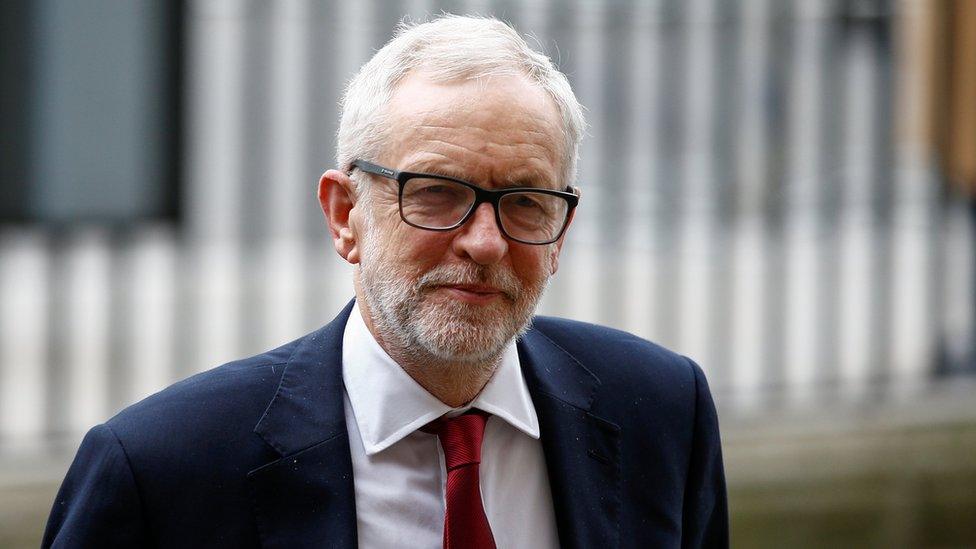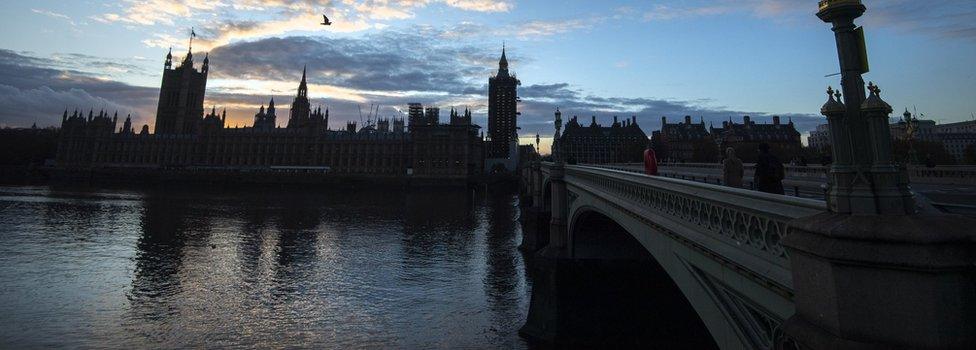Jeremy Corbyn will not return as Labour MP, says Sir Keir Starmer
- Published

Jeremy Corbyn was reinstated as a party member on Tuesday
Jeremy Corbyn will not sit as a Labour Party MP in the Commons, Sir Keir Starmer says.
The former leader was reinstated as a member of the party on Tuesday, having been suspended over his response to a human rights watchdog report on anti-Semitism in Labour ranks.
But his successor said his remarks had "undermined... our work in restoring trust" with the Jewish community.
Sir Keir said he would keep his decision under review.
Board of Deputies of British Jews president, Marie van der Zyl, said Sir Keir had "taken the appropriate leadership decision", adding Mr Corbyn had been "shameless and remorseless for what he has put the Jewish community through".
But former shadow chancellor and close ally of Mr Corbyn, John McDonnell, said the move was "just plain wrong" and would cause "more division and disunity in the party".
While many Labour MPs have supported the decision, 28 MPs and four peers have signed a statement, external - including Mr McDonnell - calling for a "swift reversal".
The Socialist Campaign Group, which includes a number of Mr Corbyn's former shadow cabinet, said the move was "wrong and damaging" to the Labour Party.
The Equality and Human Rights Commission (EHRC) published a report last month, saying Labour had broken the law over its handling of anti-Jewish racism complaints by party members during Mr Corbyn's tenure.
Sir Keir, who took over the party in April, said those who think the issue had been "exaggerated" should "be nowhere near the Labour Party".
But later, Mr Corbyn released a statement, saying the scale of anti-Semitism had been "dramatically overstated" by his opponents, and he was suspended by the party.
On Tuesday, the former leader attempted to clarify his position in public, saying "concerns about anti-Semitism are neither 'exaggerated' nor 'overstated'".
Later that day, a panel of five National Executive Committee members met to discuss Mr Corbyn's case and what action to take, before deciding to reinstate him as a member of the party.
'Judged on actions'
Despite the decision from the panel of Labour's ruling body, Sir Keir decided not to reinstate the party whip in the Commons for Mr Corbyn.
In a statement, the new leader said: "I have made it my mission to root out anti-Semitism from the Labour Party. I know that I will [be] judged on my actions, not my words.
"The disciplinary process does not have the confidence of the Jewish community. That became clear once again yesterday."
He added: "Jeremy Corbyn's actions in response to the EHRC report undermined and set back our work in restoring trust and confidence in the Labour Party's ability to tackle anti-Semitism.
"In those circumstances, I have taken the decision not to restore the whip to Jeremy Corbyn. I will keep this situation under review."
The five-member panel who decided to reinstate Mr Corbyn consisted of only two members who were outright supporters of the former leader.
BBC political correspondent Iain Watson says he understands that the panel went beyond the recommendations of party officials in insisting that Mr Corbyn be warned about his conduct and reminded of Labour's values - but the decision to reinstate him was unanimous.

What is the party whip?

MPs sitting in the House of Commons on behalf of a party are given what is called "the party whip".
It allows them to represent their chosen party and stand for them in elections, as well as ensuring they receive a letter about forthcoming parliamentary business, detailing the position the party is taking.
Having the whip taken away is considered a serious punishment by a party.
While the MP can keep their seat in the House, they are classed as an independent and cannot run for the party in the next election, unless that whip is restored.

Shadow justice minister Peter Kyle tweeted in support of his leader, saying: "We always knew tackling the cultural problems allowing anti-Semitism to exist in Labour would take time.
"We knew there would be moments that challenge and test us.
"The last 24 hours were unnecessarily difficult but Keir Starmer has acted authoritatively. We are moving forward."
Labour MP Margaret Hodge - who is the parliamentary chair of the Jewish Labour Movement - also supported the move.
She said Mr Corbyn had "refused to himself accept the findings of the EHRC report, refused to apologise for his actions and refused to take any responsibility", so it was right to withhold the whip.
But her colleague on the backbenches, former shadow justice minister Richard Burgon, said his former boss "should immediately have the whip restored".
He added: "At a time of national crisis, division in the Labour Party serves nobody but the Tory government."
And Jon Lansman - who founded the Corbyn-supporting Momentum movement within Labour - said the decision had "driven a coach and horses through the party's disciplinary process".
He said it made it "subservient to the parliamentary party" and "embedded 'political interference'", which the party was condemned for in the EHRC report.


Sir Keir Starmer was under huge pressure to take further action against Jeremy Corbyn - not just from Jewish groups, but from some of his own MPs.
Friends of Margaret Hodge say she was on the verge of resigning yesterday when Mr Corbyn was readmitted to party membership.
If a prominent Jewish MP had gone under Sir Keir's "new leadership", then his commitment to rooting out anti-Semitism would be questioned.
I'm told he didn't take the final decision to suspend the whip until this morning - the decision was then conveyed to the former leader by the chief whip, and the die was cast.
The uneasy truce between supporters of the old and new leadership was breached - with Momentum and members of the Socialist Campaign Group denouncing it.
Attempts had been made behind the scenes, even from some on the Left, to get Mr Corbyn to apologise for the comments that led to his suspension.
That would have made his re-admittance to the Labour's ranks less controversial - but he stopped short at a "clarification".
So ultimately, Sir Keir had to choose whether he would be more damaged by a row with the party's left or risk the charge that he had gone soft on his pledge of zero tolerance on anti-Semitism.
Drawing a line under the anti-Semitism rows is proving far easier said than done.
